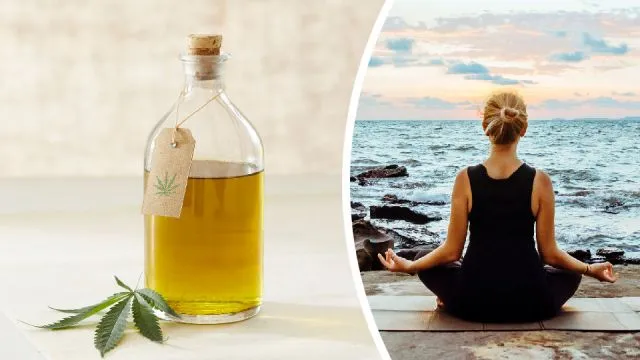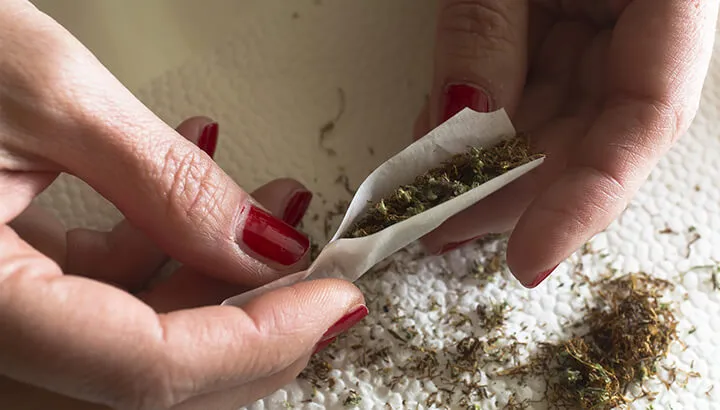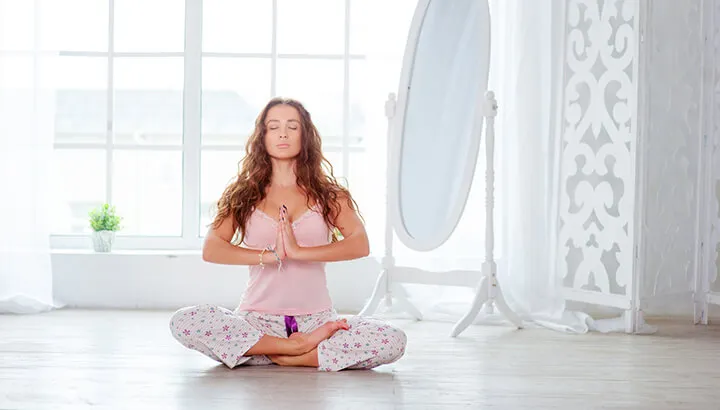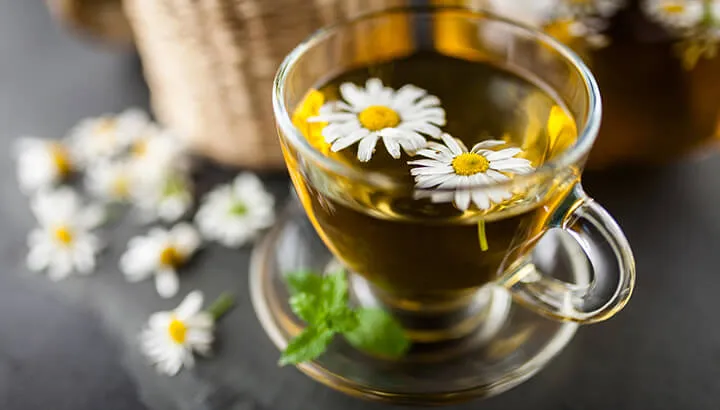
- Share on Facebook92
- Share on Pinterest
- Share on Twitter
Anxiety has been likened to quicksand — it is a mindset that is difficult to escape. Rates of the condition appear to be on the increase and people diagnosed with generalized anxiety disorder are at greater risk for a number of health problems including gastrointestinal disorders, heart disease and migraine headaches.
Traditional treatments for chronic anxiety include tranquilizers, antidepressants and beta-blockers, but each of these medications entails severe side-effects. As a result, psychologists, psychiatrists and medical practitioners (not to mention patients) are on the lookout for safer and more effective treatment options.
Of late, both marijuana and meditation have generated interest as alternative approaches to counteracting anxiety. How effective are they in alleviating mental distress? Here’s what you need to know.
New research on marijuana and anxiety

These are rather heady days for cannabis. In case you’ve been tuning the news out, the World Health Organization has convened a special session to review marijuana’s medical status, Dr. Sanjay Gupta wrote an open letter explaining the evidence-based benefits of using pot to ease the opioid epidemic, and former Speaker of the House, John Boehner, just joined the board of a cannabis startup.
When a lifelong Republican (who used to be used to be an anti-pot crusader) joins a marijuana firm’s advisory board, then you know it’s only a matter of time before weed-based businesses start sprouting up nationwide.
Cannabis is also generating a lot of positive news buzz in other areas too. Recently, a number of studies have concluded that the herb can significantly alleviate anxiety, stress and depression.
Findings like these are giving many people high hopes that compounds found in marijuana (most notably CBD) may help individuals suffering from mood disorders and psychiatric conditions like PTSD.
How convincing is the evidence?
How does cannabis stack up against anxiety treatments that we know are safe and effective (like yoga and meditation)? Let’s take a look at some of the most compelling evidence:
- A study by scientists at the Washington State University found that just a couple of puffs of marijuana is enough to lower anxiety and depression for most users. This was one of the first studies to examine the strain-specific effects of cannabis on mood. The researchers concluded that herbal strains high in CBD (a natural anti-inflammatory compound with no psychoactive properties) but low in THC (the compound responsible for marijuana mind-altering effects) had the most beneficial impact on mood. Summarizing the results, assistant professor of psychology, Carrie Cutler, explained that “one puff of cannabis high in CBD and low in THC was optimal for reducing symptoms of depression, two puffs of any type of cannabis was sufficient to reduce symptoms of anxiety, while ten or more puffs of cannabis high in CBD and high in THC produced the largest reductions in stress.”
- Research published in the journal Neuropsychopharmacology found that the CBD in cannabis “significantly reduced anxiety, cognitive impairment and discomfort” in patients suffering from social phobias and conditions like seasonal affective disorders.
- In 2012, researchers reported that compounds in cannabis offered enormous potential for treating anxiety and other mood disorders.
In the past, studies investigating marijuana’s effect had been mixed, but scientists believe the primary reason for this is that previous research did not distinguish between CBD (known for its calming effect) and THC (a compound that can induce temporary feelings of paranoia).
For a look at how CBD oil is easing anxiety in some patients you can check out cool video:
While the latest studies on cannabis and anxiety are encouraging, there are some caveats too. For one, the scientists at Washington State University noted that long-term heavy use of cannabis may actually worsen symptoms of depression. As they explain, “continued use [of cannabis] may exacerbate baseline symptoms of depression over time.”
Why meditation is the best choice for treating anxiety

On the other hand, studies suggest that meditation offers unequivocally positive benefits when it comes to alleviating anxiety, but without any known downside.
Confirmation of that meditation can mitigate anxiety can be found on multiple fronts. For example, recently researchers investigating meditation techniques presented impressive study results at an annual Experimental Biology conference.
According to Dr. John J. Durocher an assistant professor of biological sciences at Michigan Tech who presented the findings at the scientific gathering, “Our results show a clear reduction in anxiety in the first hour after the meditation session, and our preliminary results suggest that anxiety was significantly lower one week after the meditation session.”
In fact, the evidence supporting meditation as a first-line treatment for anxiety and depression is especially persuasive because it has been confirmed in a number of ways.
- EEG electrodes used to measure brainwave activity show that meditation induces more relaxed mental states.
- Neuroimaging and MRI studies show that meditation, yoga, and Tai Chi impact brain structure in a positive way.
- Sonograms show that meditation can have positive effects on cardiovascular health. For instance, as Dr. Durocher noted about subjects in his recent study, “[our] participants also had reduced mechanical stress on their arteries an hour after the [meditation] session. This could help to reduce stress on organs like the brain and kidneys and help prevent conditions such as high blood pressure.”
Numerous other studies confirm that meditative practices reduce biomarkers correlated with coronary artery disease. Taken together, the evidence is overwhelming that meditation (and related mindfulness activities like yoga and tai chi) counteracts anxiety and stress.
To learn more about how you can use meditation to reduce anxiety you can check out this fantastic video with psychologist Daniel Goleman:
The evidence that cannabis can reduce stress and anxiety is also persuasive and encouraging, but it is not as unequivocally positive as the data supporting meditation. Thus far, the research appears to suggest that low doses of strains that are high in CBD (but low in THC) appear to be the most efficacious when it comes to reducing anxiety.
Additional tips for coping with anxiety

Rates of anxiety have been rising in our society, particularly among adolescents and young people. According to some of the latest statistics, more than one teen in twenty suffers from some form of severe anxiety or depression. Experts suggest a number of things that can help individuals cope with anxiety including:
- Finding social support networks
- Discovering a mindful activity that you practice regularly (this could be meditation, prayer time or solitude breaks)
- Engaging in stress-busting forms of physical activity (like walking, swimming or dancing)
- Learning everything you can about anxiety. As therapist Laura MacLeod explains, “being proactive about seeking information is a strong, practical way to fight anxiety … [Doing so] builds your self-esteem, which also decreases anxiety.”
- Take up a hobby that gives you pleasure (be it a musical instrument, gardening or knitting)
- Take your focus off yourself by doing something for others. Volunteering is a great antidote for affluenza-related anxiety
- Using stress-busting plant-based essential oils to alleviate anxiety
- Eating more stress-busting foods (try chamomile tea, nuts, avocados and bananas)
Anxiety is a part of the human condition and no one is immune from it. But when it starts to interfere with your life, then take a deep breath and consider these wise words from Deepak Chopra: “The best use of imagination is creativity. The worst use of imagination is anxiety.” Anxiety may be a part of your life, but it should not define or circumscribe it.
— Scott O’Reilly
- Share on Facebook92
- Share on Pinterest
- Share on Twitter

